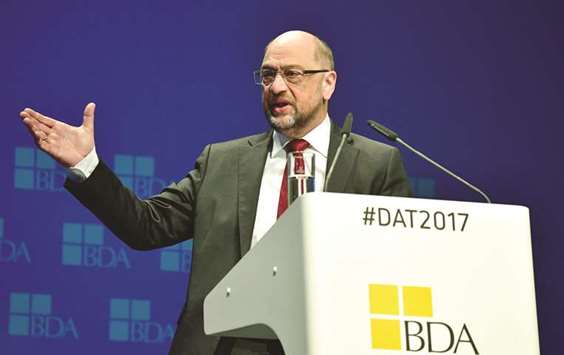German Chancellor Angela Merkel took the first step yesterday towards forging a new conservative-led coalition when she met with party leaders to draw up a framework for the negotiations.
Merkel’s meeting comes a day after the centre-left Social Democrats (SPD) agreed during a special conference to launch coalition talks with her Christian Democrats (CDU) and their Bavarian-based sister party, the Christian Social Union (CSU).
Entering yesterday’s meeting with Merkel and CSU chief Horst Seehofer, SPD leader Martin Schulz said that his party saw the talks as a chance “to make the lives of people in our country better”.
At the same time, he said that a new government would mean Germany living up to its international obligations and ensuring “the unity of Europe”.
Earlier yesterday, President Frank-Walter Steinmeier stepped up pressure on Germany’s major parties to rapidly build a government, amid signs of fresh tensions between political leaders on the negotiations.
“We all feel people in Germany expect that, more than four months after the election, a new government should be formed,” he said.
As the nation’s largely ceremonial head of state, Steinmeier would have a key role to play in deciding whether to hold fresh elections if the negotiations failed to produce a new coalition government.
“With a view of the world beyond German borders, there is also a need for a German government that helps to bring peace and order back to crisis regions in this world,” said Steinmeier, who was SPD foreign minister in Merkel’s last coalition government.
Formal coalition negotiations are expected to be launched this week and could possibly drag on until March.
However, resistance in the SPD to again teaming up with Merkel’s conservatives has served to underline the deep rift in the party over the coalition talks.
Only 56.4% of the 642 SPD delegates voted in favour, while 43.5% rejected backing a re-run of the Merkel-led coalition after support for the SPD plunged to its lowest level since 1949 in the September election.
Underscoring the pressure on Schulz, support for the SPD has now hit a new historic low of just 17% – down from the 20.5% it reached in the September election – according to a survey conducted by Berlin pollsters Forsa after Sunday’s conference.
If successful, the talks to forge a new government would create the third so-called grand coalition of major parties led by Merkel since she came to power more than 12 years ago.
However, the SPD’s roughly 450,000 rank-and-file members still have to vote on any coalition agreement reached by their party leaders with Merkel’s conservatives.
Highlighting the tough round of coalition negotiations ahead, the CDU-CSU stepped up their opposition to any changes to agreements made with the SPD at exploratory coalition talks that ended on January 12.
“If you try to reopen parts of it, then you will reopen the entire package,” Annegret Kramp-Karrenbauer, premier of the small western state of Saarland and a leading CDU member, warned in an interview with German public radio SWR.
Schulz has already warned the CDU-CSU that they face tough talks after telling SPD delegates on Sunday that he would deliver enhancements to the package of measures that was already agreed to in exploratory talks.
This included improvements to refugee family reunions and the labour market, as well as once again pursuing the SPD’s demand for a radical makeover of the German health insurance system.
“The SPD’s negotiating position is strong,” said Schulz after yesterday’s meeting of his parliamentary group, brushing off concerns about resistance in the SPD to the talks. “A mandate is a mandate.”

Schulz: The SPD’s negotiating position is strong.
